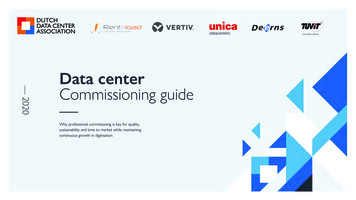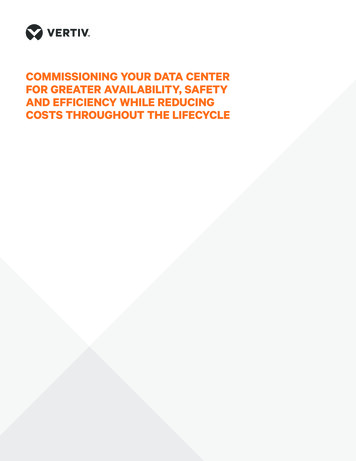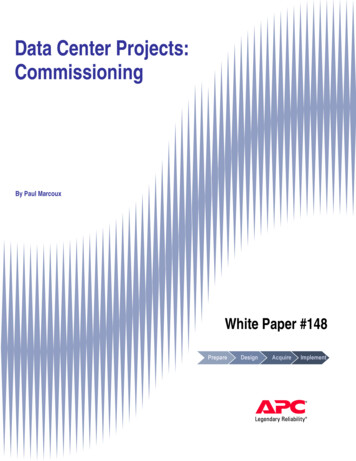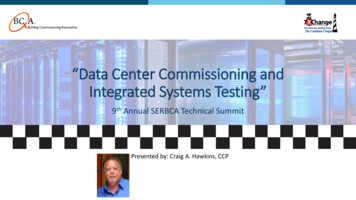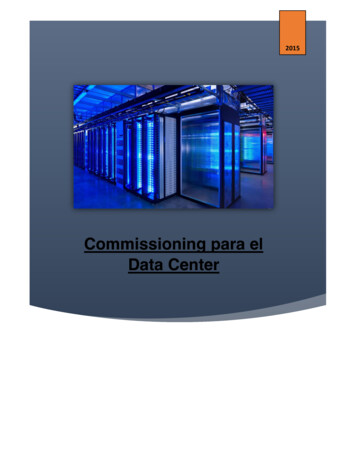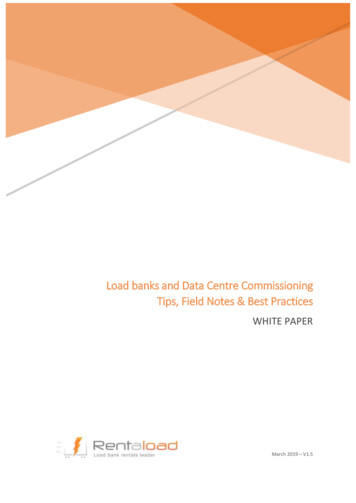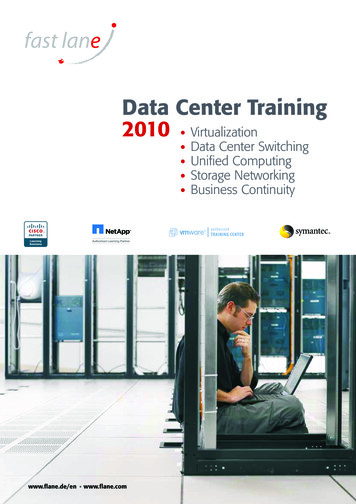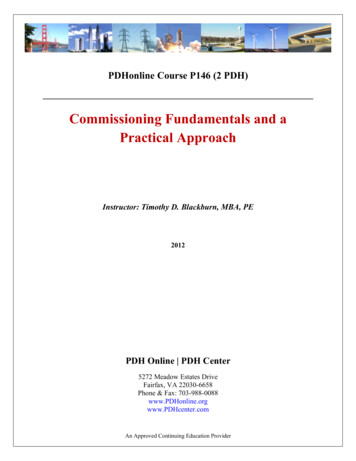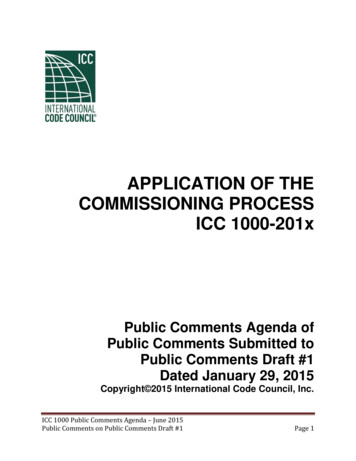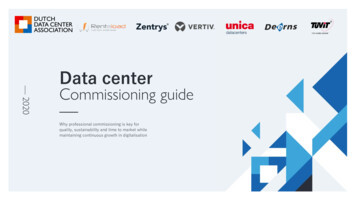
Transcription
— 2020Data centerCommissioning guideWhy professional commissioning is key forquality, sustainability and time to market whilemaintaining continuous growth in digitalisation
1.Data centers commissioningCommissioning has now become a business necessityWhen building a new data center, the owner of the data center has no guarantee that the various physical infrastructure subsystems – power, cooling, firesuppression, security, and management – will work together. Commissioning is the process that reviews and tests the data center’s physical infrastructure designas a holistic system in order to assure the highest level of reliability.Traditional commissioning is a daunting task. Since formal system operation doesn’t begin until the system is commissioned, the commissioning team experiencesintense pressure to complete the commissioning process quickly. Commissioning can involve high expense and requires staffs from different departmentaldisciplines to work together. For these reasons data center commissioning has almost uniquely been associated with large data centers.In the recent past, many data center managers chose to roll the dice and perform little or no commissioning, relying only on start-up data to press ahead withlaunching the new data center. Given the reality of 24x7 operations, however, the alternative of exposure to major system failures and accompanying downtimeis no longer an economically viable option. Commissioning has now become a business necessity.“Commissioning is verifying and documenting that the facility and all of its systems and assemblies are planned, designed, installed, tested, operated, andmaintained to meet the needs of the owner.”
2.Why do you need a commissioning?It is important to know WHY because this focusus on the purposeOne of the first questions which should be answered is: Why do we need a commissioning and what is thegoal of the commissioning? This should translate in how and what we are commissioning. The reasons may vary(multiple answers possible):ooooooooCompliance, Proof of evidence, Guarantee, LiabilityCertificationsCustomer and/or stakeholder drivenOwners delivery standardsStress test / punchesLocal and (Inter-)National regulationsHand-overTraining operational staffKnowing why helps guiding the overall commissioning process and achieving a clear goal.The design and construction process is only a limited period in the entire lifecycle of a data center. In mostprojects we see the pressure cooker is on during this process and commissioning is seen as a bottle necktowards hand-over to operations. The commissioning process is however one of the most critical processes asit will be difficult, not to say impossible to repair a number of punches during the commissioning.
2.How?StepsStep 1: Integration with the designThe ability to commission equipment should be considered at the earliest stage of every project.Step 2: PlanningMake the testing regime system simple, efficient and standardized - and most importantly transparent.Step 3: The factory acceptance testValidation before any product arrives on site can avoid any costly and time-consuming issues.Step 4: Visual inspectionsMake sure that any delivered equipment is visually inspected for signs of damage, defects should be reported.Step 5: Site acceptance testingEach product and service should be physically and independently tested on site to verify performance criteria.Step 6: System operation verificationData networks are to be independently certified to ensure functional communication between equipment.Step 7: Integrated system testingThe final integrated system test is the opportunity to observe the performance at maximum design load.
2.What?Defining the different commissioning phasesTesting components is not enough. Datacenter systems may be simple, but their interaction isn't.Level 5 testing verifies reliability of design and compatibility among all critical systems (ElectricalMechanical, Environmental). You must test in all modes (Failure, Safety, Emergency).Commissioning itemso General building testso Security and monitoring systemso Cooling systemso Power systemso Integrated system testingThis question contains the action plan in the different levels resulting in scenarios. Based on themaster commissioning plan wherein we have agreed budget, risk, time and minimum requirementsare described we carefully plan the different actions or scenarios.The question that should be answered during the entire commissioning process is often forgotten:When are we successful in achieving our goal?
3.RequirementsDefining the different commissioning requirementsOne word: Research! Take time to do the proper research to ensure you build a competent team. Once you have found the right general contractor, design team,commissioning agent and vendors, the likelihood of success has already increased exponentially. The budget should cover all items and personnel needed to support thecommissioning. Scheduling should be timely and covers all commissioning activities to avoid any delays. Allow room for flexibility.o Assemble the right commissioning teamo Involve key stakeholders in the commissioning planning processo Create the Owner’s Project Requirements (OPR) documento Determine the initial commissioning scope, schedule, and budgeto Define the commissioning plan and implement contingency plans for special circumstanceso Focus on selecting innovative load testing services that improve set-up time, safety, and operational efficiencyo Implement a testing strategy into the commissioning plan that simulates electrical and thermal load characteristics of the equipment used in the data center low ΔT (deltaT) load banks for exampleo Integrate power quality monitors and connected equipments (sensors, load banks, measurement equipments) to collect more data, reduce reporting time, and consolidatedeviceso Effective document control and reporting
— 2020For more information pleasedownload the ISAT-CommissioningRapport 2020 ondutchdatacenters.nl/publicaties
Data centers commissioning When building a new data center, the owner of the data center has no guarantee that the various physical infrastructure subsystems –power, cooling, fire suppression, security, and management –will work together. Commissioning is the process that reviews
